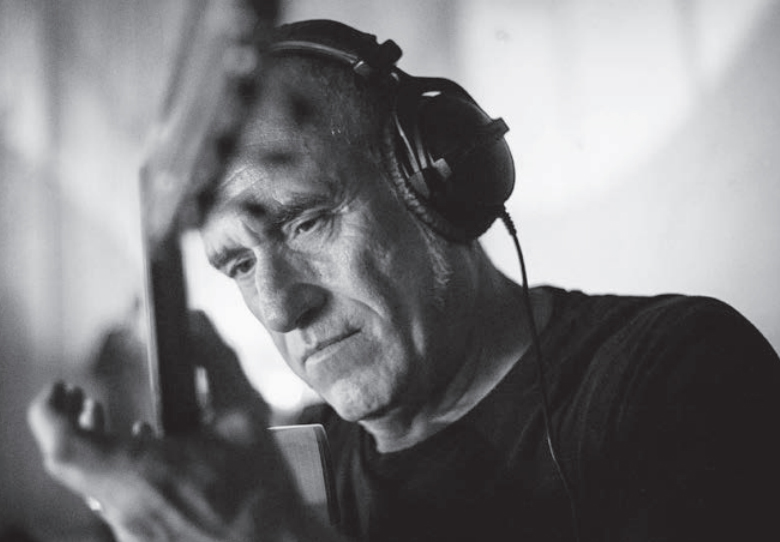Global Beat: David Broza

A few years ago, when David Broza first had the idea for his recent single “Tears for Barcelona,” the city had just endured a terrorist attack. “I had been there so many times,” he recalls, “So, to me, it was a romantic connection. And it hit me really hard. On the spot, my hand just went to my guitar and started playing, and I was thinking of an adagio— just a slow, meditative piece. I don’t know what led me to the melody, but I realize now that I was actually soothing my own soul. I was calming myself. There was no question what to call it.”
At the time, Broza was assembling songs for a new release with Steve Greenberg’s S-Curve label. In 2015, the company put out Broza’s critically lauded East Jerusalem, West Jerusalem—a star-studded collaboration co-produced by outlaw country firebrand Steve Earle. Greenberg challenged Broza to create an instrumental guitar suite—a project he’d never attempted, and which made him uncharacteristically nervous. After 30 albums and more than four decades as one of Israel’s most revered and pointedly outspoken singersongwriters, he wasn’t sure he could carry a recording without the power of lyrics.
“It’s a very different craft, and I had to teach that to myself,” Broza says. “It takes me long enough to write just a melody, but to keep the story going through the melody without any lyrics—well, that’s a different discipline. And since my influences come from such eclectic places in my head, I didn’t follow one particular line. The only thing that connects it is my Spanish guitar—my classical guitar.”
His new LP, en Casa Limón, traces a journey that arguably started during his teenage years. In the late ‘60s, Broza’s father moved his family from Haifa to Madrid for a shortterm business opportunity, but when the deal fizzled, they had to settle in for a long stay—an auspicious twist for the young and hungry Broza. Flamenco music was everywhere, and he felt inescapably drawn to it, picking up the guitar and absorbing the area’s rudiments and rhythms before he returned to Israel for his military service. By 1977, he had channeled his experiences into one of his earliest songs, “Yihye Tov” (“It’ll Be Alright”), which became an Israeli hit.
In a sense, en Casa Limón marks a profound reconnection for Broza, now 64. Not only did he record the 12-song set in Madrid with producer Javier Limón (who played on Broza’s 2004 release Parking Completo), but he also tracked most of it on guitars owned by the late flamenco legend Paco de Lucía. Limón had worked with de Lucía for years, and he just happened to have the guitars in the studio.
“Javier showed me these three guitars, and I said, ‘Wow, these are beautiful,’” Broza recalls. Limón invited him to take his pick and try one. “At first, I didn’t want to touch them because I play a very fierce guitar, so I could break one of these in no time. And Javi said, ‘Come on, not for this album. You can play softer.’ And lo and behold, it was like running on feathers, where I’m used to running on cast iron. Even though I play different styles, I’m from rock-and-roll, where you fall on your sword— you give it all you’ve got, and you sweat it all out. Once again, this was very different.”
Broza put himself through a strict regimen to prepare for the sessions, which took place over the course of a week last September. He likens the process to a prizefighter training for a bout. “I went to Spain for the summer and, for three months, I sat there eight hours a day and just practiced. I don’t have teachers or any real method—I just invent my own exercises. And I do a lot of physical workouts to keep in shape because eight hours gets intense, and I’ve gotta get my hands and shoulders working. It’s a lot of physical activity.”
en Casa Limón leads off with “Guitar Confessions,” which nearly tells the album’s whole story by itself. Broza brings a disciplined but fluid and acrobatic approach to his guitar lines—at times recalling the masterful stroke of de Lucía—while still injecting his distinctive flair for rock, jazz and even Django-like gypsy styles. By contrast, “Saturday Morning Jig” conveys the bounciness of its title, with Tali Rubinstein’s breathy recorder spinning up a pastoral air. “Nili’s Waltz,” named for Broza’s wife—fashion designer Nili Lotan—captures a wistful sense of romance that seems to weave its way through all of Broza’s music. It’s a sensibility that also fuels the vaguely south-of-the-border Mariachi feel of “Una Flor En Masada,” which features the instantly recognizable Randy Brecker on trumpet.
All of which comes full circle on “Tears for Barcelona,” a song that takes on an entirely new meaning in the shadow of a worldwide viral outbreak. “We’re right here in the midst of a pandemic,” Broza says, noting that he and his wife rode out the lockdown at their apartment in New York’s Tribeca neighborhood. “I don’t think anything could better suit the hearts and minds of people right now than a relaxing piece. When I played it back for Steve Greenberg, he said, ‘Let’s go with it,’ and I’m thinking, ‘God bless you.’ This is not what you would call a single when you normally think about these things; you look for something more rhythmic or sensational. And you know, making this whole album really stretched my ability, but it still has a meditative mood. And that makes me happy.”



















